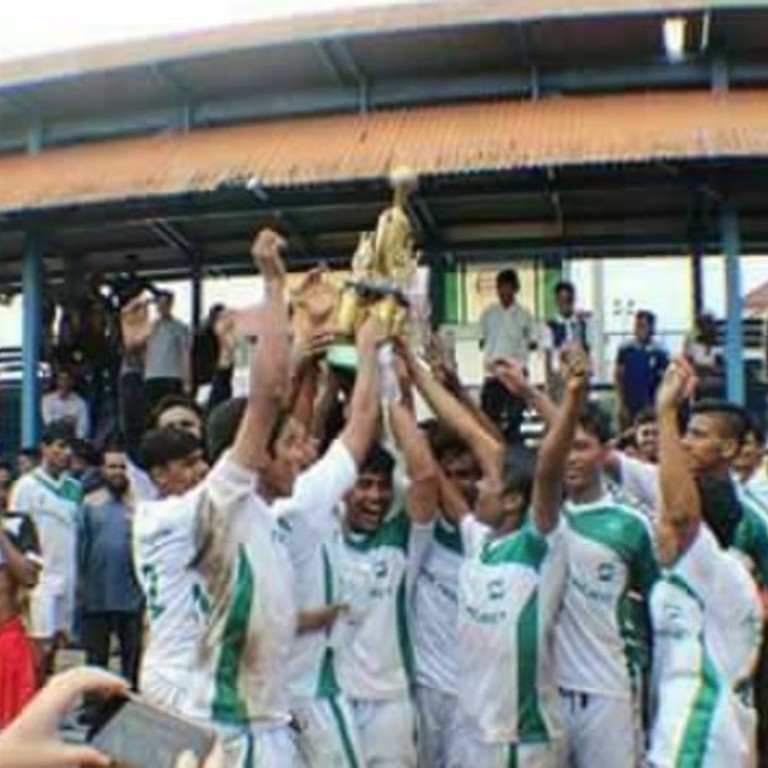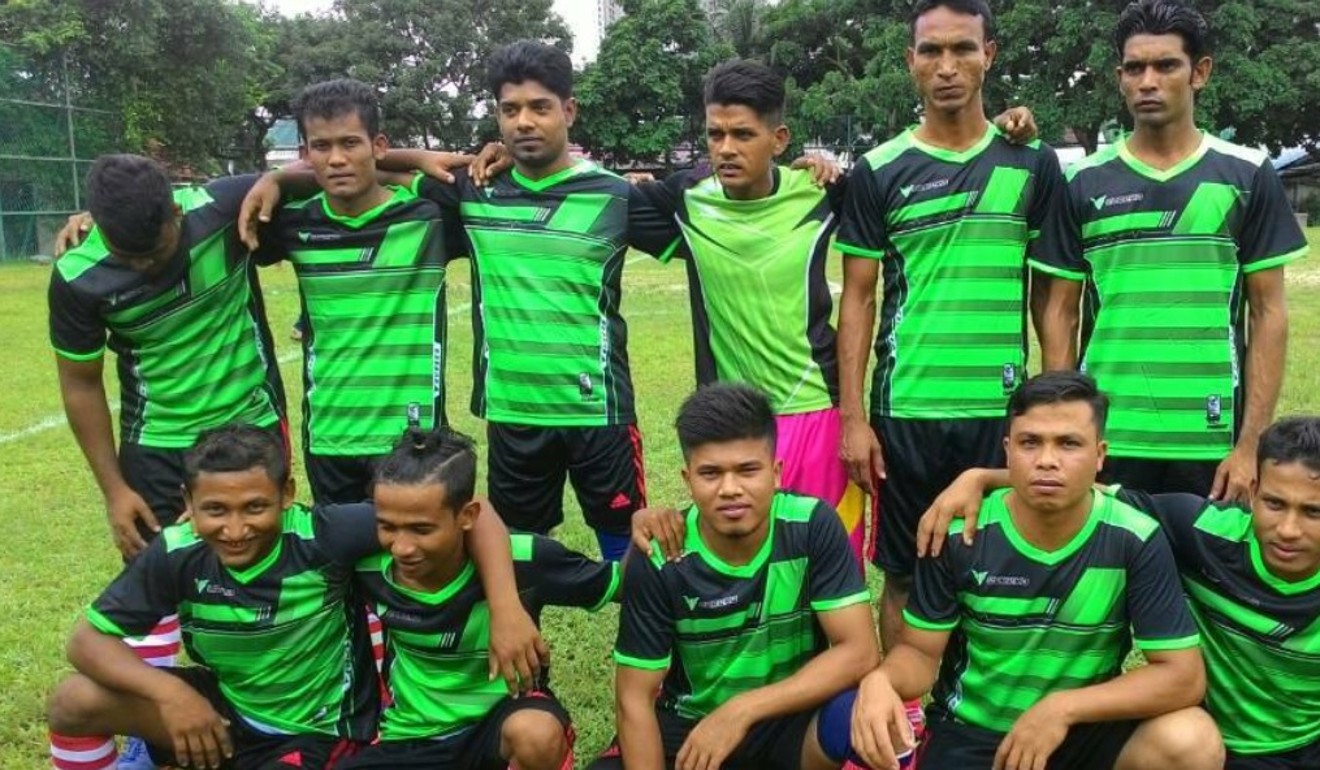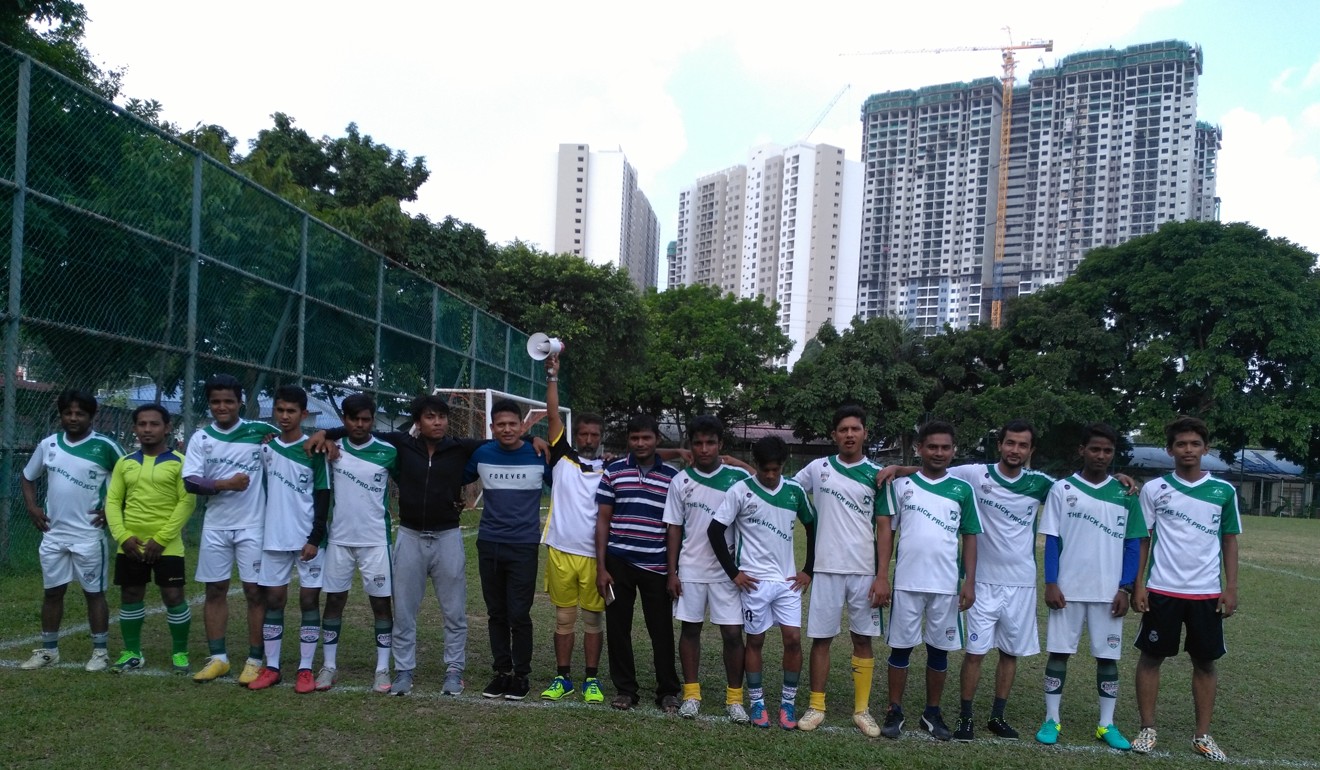
Rohingya Football Club refugee team seek to raise awareness of suffering through soccer
Each member of the 35-strong squad has a heartbreaking story to tell but their sporting goal is to compete in the Minorities World Cup
Mohammed Faruk wanted to meet in an area of Kuala Lumpur where locals rarely venture and where visitors are warned to stay away.
The 24-year-old insisted. He wanted to eat at the Myanmar restaurant near the Kota Raya complex, where thousands of migrant workers – some legal, some not so – gather every day for a variety of reasons – some legal, some not so.
Malaysians consider the place unsafe. But Faruk felt at home there. Indeed, he is safer in a Myanmar eatery in Kuala Lumpur than he would be almost 2,700 kilometres away in the actual country, where his fellow Rohingya are being persecuted by government forces and Myanmese who want to rid the land of people like him.
But Faruk is on a mission – to promote the cause of Rohingya people through soccer.

Faruk, who came to Malaysia as a refugee five years ago, is secretary of Kuala Lumpur-based Rohingya FC, who train regularly and have ambitions of playing in the ConIFA World Minorities Cup.
“But we haven’t trained in a while,” said Faruk. “With what’s happening in Rohang (Rahkine) state now, we don’t think it’s right that we should be playing football.
“But we are the first Rohingya national football team.”
Faruk has been a refugee almost all his life and considers himself among the blessed Rohingya who are safe from what the United Nations described as ethnic cleansing of his people from Rakhine state.
Officials say up to 500,000 Rohingya have fled Rakhine into neighbouring Bangladesh, which is struggling to cope with the arrivals.

The 150,000-odd Rohingya refugees in Malaysia are among the more fortunate ones, but despite being on safe ground grief is never far away.
Abu Toyoub is a 21-year-old Rohingya FC player from the town of Muangdaw in Rahkine state. He left Myanmar in 2012 during the communal riots and he spent 15 days on a boat before arriving in Malaysia.
According to Faruk, two of Toyoub’s uncles were killed by the Myanmar military on August 26 and the rest of his family members have since fled across the border to Bangladesh.
“I left Myanmar because the military were arresting young people in Muangdaw and I was scared that I would be taken in,” said Toyoub, who works as a grass cutter in Kuala Lumpur. “I felt that’s the only way to save my life.”
Each of the 35 members of the Rohingya FC team – players and management – has a similar story to tell about suffering, loss, despair and heartache.
“Every one of us has gone through something,” said Faruk, whose father is now in a refugee camp in Bangladesh.
Watch news report on Rohingya Football Club
“But it’s not something that we talk about. We can just look at each other’s faces and we know.”
ConIFA, founded in 2013, is the football governing body for teams from nations, de facto nations minorities and isolated territories that may be lacking a political voice or recognition in their geographical homes.
Rohingya are among the 46 ConIFA members, the list of which looks like a snapshot of every separatist movement – peaceful and violent – in almost every corner of the world and includes the likes of Tibet, Panjab, Northern Cyprus and even Quebec and Monaco.
The next Minorities World Cup is slated for 2018 in Barawa in south-western Somalia, but Faruk is confident that the one after that will be held in Malaysia, with qualifiers to begin in 2019.
ConIFA did not respond to inquiries from the South China Morning Post about future Minorities World Cup events.
Rohingya FC is also involved in fundraising for their displaced brethren in Bangladesh and use playing opportunities – offered by local social clubs and representative teams – to increase awareness of the plight of their people.
“Every month we send about 3,000 [Malaysian] ringgit (HK$5,560) to Bangladesh, sometimes from our own pockets,” said Faruk, who used to work as a translator for the UNHCR but is now unemployed.
“There are many agencies who help the Rohingya people but we focus on those for whom the help is not reaching them and we know where they are because we know them.
“We manage to send enough to feed from 500 to 700 people a day.”

The Rohingya are labelled as “Bengali” by the Myanmar government and are not recognised as citizens.
Bangladesh also refuses to acknowledge them as its own, which is fine by Faruk because the Rohingya – described by the UN as “the most oppressed people in the world” – consider themselves Myanmar through and through, even though they are despised by the majority Buddhists.
“We are from Myanmar,” he said. “We have history there, we have lived there for many years. Our homes are there and our people belong there.
“We consider ourselves from Myanmar and that fact cannot be changed.”
Despite feeling a sense of belonging to the land, Faruk shakes his head in disgust when the topic comes to the people they share it with.
“We’re talking about the military, the Buddhists and the government. Three heads but all with the same heart,” said Faruk, who reserved particularly vitriol for the country’s de facto leader Aung Sung Suu Kyi – the Nobel peace laureate who has refused to acknowledge ethnic cleansing of Rohingya.
“She should be stripped of her Nobel Peace Prize,” said Faruk.
Watch Mohammed Faruk being interviewed on Astro Awani (2:06 mark)
Suu Kyi has accused Rohingya of attacking Buddhists, which Faruk rejects.
“We are not terrorists,” said Faruk, who is grateful to Bangladesh for accommodating the refugees and as well to the Malaysian government for taking them in.
“We want peace. We want to go back to our home and just live in peace with the other Myanmar people.
“We play football. We want peace through football. But there are hundreds of thousands of Rohingya in Bangladesh and other places who can’t have this right now.”
The team were supposed to return to training on Saturday, but were struggling to raise the 300 Malaysian ringgit needed to rent the field for a few hours.
“We are still looking for sponsors to give us kits, shoes and help us rent fields so we can train regularly.”

